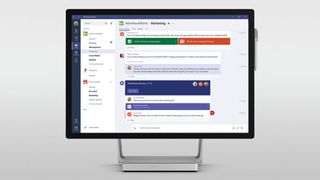Microsoft Teams may finally be about to get this super useful feature
Teams users will soon be able to switch accounts more easily

The desktop version of Microsoft Teams is getting a new feature that will allow users to add multiple accounts and manage them without logging in and out. The new feature is likely to be welcomed by employees that have found themselves taking part in a large number of video conference calls since the start of the coronavirus pandemic.
For individuals that use Teams frequently, it is quite likely that they employ multiple accounts depending on which clients they are working with. Previously, switching accounts required a Teams user to manually log out before logging back in, resulting in a frustratingly long-winded process and ever-more credentials to remember.
Now, it appears that Microsoft is testing a new feature that will allow Teams users to link accounts together, enabling them to switch directly by altering their Settings. The ability to switch accounts is expected to begin rolling out later this year or early next, although test users may gain access to the feature even sooner than that.
- Check out our list of the best video conferencing software available
- And here's a list of the best online collaboration software
- The best business webcams for home working
Switching it up
The new account switching update is not the only new feature coming to Teams. Microsoft has also confirmed that it is testing a feature that will allow users to create custom pages that will enable businesses or educators to create a more cohesive team identity. Invite links have also been improved, with invited users now gaining access to notes, files – basically anything shared during a call – even after the meeting is finished.
The video collaboration space has become increasingly competitive since the COVID-19 pandemic severely reduced the amount of face-to-face interaction allowed in many countries. Zoom, Google Meet and Cisco’s Webex are all competing with Teams to offer the best service. User figures for all these solutions, where available, have received a massive boost.
- Check out our list of the best headsets for conference calls right now
Via Windows Latest
Are you a pro? Subscribe to our newsletter
Sign up to the TechRadar Pro newsletter to get all the top news, opinion, features and guidance your business needs to succeed!
Barclay has been writing about technology for a decade, starting out as a freelancer with ITProPortal covering everything from London’s start-up scene to comparisons of the best cloud storage services. After that, he spent some time as the managing editor of an online outlet focusing on cloud computing, furthering his interest in virtualization, Big Data, and the Internet of Things.

